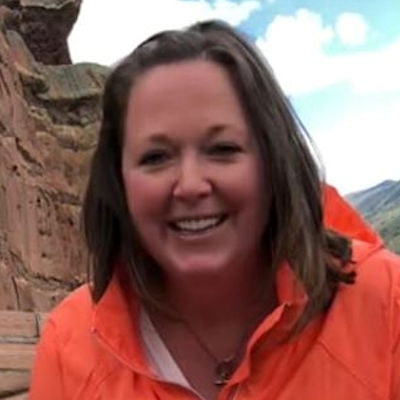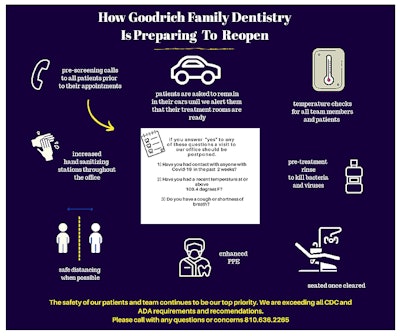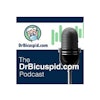
It's difficult to fully comprehend how much unwanted change COVID-19 has caused in our lives. It has resulted in my new, least favorite job (because I am terrible at it), which is suddenly becoming a home-school teacher to my 7- and 11-year-olds.
 Katie Hess, RDH.
Katie Hess, RDH.While I miss visiting restaurants, the gym, movie theaters, and shopping at Costco without a mask, I also miss going to work, my patients, and my coworkers. I want to resume normal, everyday life -- not this new normal we are trying to create, but rather my old normal. Every time I step out into public, the reality of what is currently going on smacks me in my mask-wearing face and reminds me that this isn't going away anytime soon.
This is a huge adjustment for those of us working in dentistry, but we need to remember it is also a big adjustment for our patients. The plexiglass that now separates us from the checkout person at the grocery store seems cold and disconnected, so I can only imagine what patients, who are accustomed to warm, personal appointments in our practices, will feel when we emerge from a cloud of disinfectant fog in a hazmat suit wearing what appears to be a flimsy welder's shield.
I work with offices that are focused on providing patient-centered, exceptional dental care and experiences. To provide that kind of atmosphere, we put a lot of effort into building relationships with our patients. While figuring out the logistics of acquiring the proper personal protective equipment (PPE) and keeping our team members and patients safe, let's try to go the extra mile and remember we are there with a goal of also making patients feel comfortable.
Here are five things I am suggesting to the offices I work with to help improve the patient's dental experience.
1. Improve communication
Right now is a great time to communicate with patients through social media and newsletters. The more contact you can have with your patients, the better.
Below is an infographic that I have set up for numerous offices. You are welcome to use and edit it. If you need help, please contact me by email.

I recommend calling all patients at least 48 hours prior to their appointment. Although the automated reminders are typically the way to go, I would also personally call during these times. Check in on your patient, confirm his or her appointment, and run through what the appointment will look like. Setting and managing expectations prior to the patient entering the office will make this transition easier for everyone involved.
These calls can't drag on forever, but you also don't want a drill sergeant making them. This call can create a sense of caring while also addressing issues ahead of time and save you from dealing with problems while the patient is in the office.
2. Stay positive
For many patients, a visit to the dentist will feel like another area of their lives that has changed for the worse. We know that even during regular times, most people don't look forward to dental appointments, and many have a certain amount of dental fear/anxiety. If "white coat syndrome" was a thing before, COVID-19 has taken it to a new level.
The faster we can move our patients past the initial shock of our upgraded PPE and the new protocols, the better. If you have team members who tend to focus on the negative, helping them stay positive will also be important. We can and should be honest and transparent that this is a difficult time. However, dwelling continuously on this will not help anyone or anything.
Working with your team on verbiage and talking points to focus on the positive will help them guide their conversations during appointments. These points can include topics like how happy we are to be back doing what we love and how fortunate we are that our doctors are providing everything needed to keep the team and patients safe. We can also have statistics and facts readily available to show how dentistry has always taken massive precautions to protect ourselves and patients from disease.
In general, people can benefit from a dose of positivity right now. They can find negativity everywhere else. Sending your patients out the door feeling more hopeful than when they walked in should be considered a victory.
3. Personalize where possible
Most of us are now close to unrecognizable since we are covered from head to toe with PPE. Having the names of your team members embroidered on their lab coats or providing them with a name tag is something to consider. If someone in your office is crafty, consider personalizing the face shields.
I also like the idea of putting a printed-out card in the patient's goodie bag that is signed by whoever is seeing that patient (these can be signed prior to the appointment so they are ready to go). This is an extra touch, and it lets the patient know you are there if they need you and reminds them of all the ways they can connect and communicate with your office.
4. Show your smiles -- in a new way
If you have a TV in your waiting room/reception area, a team photo of welcoming smiles is a great use of that technology right now. Having a framed team photo would also work. Anything to show the personal side of your team -- behind the PPE.
5. Follow up
Right now is a huge opportunity to build strong relationships with patients. Follow up with the patients who will appreciate you following up. If you treated a patient who seemed like he or she was struggling with life at the moment or there is something that warrants follow-up, send a card or give that patient a call.
Dentistry has fought hard to educate our patients and the medical community on how important we are in achieving overall health. As we continue to find our way through this pandemic, I think we will begin to see that we have an opportunity not only to help our patients achieve dental and physical health but also to play a more important role in their emotional health.
Katie Hess is a dental hygienist who has written the All The Dental Things blog since 2011. She currently works virtually with dental offices to improve their communication and relationships with patients and team members through social media, newsletters, and reviews.
The comments and observations expressed herein do not necessarily reflect the opinions of DrBicuspid.com, nor should they be construed as an endorsement or admonishment of any particular idea, vendor, or organization.



















